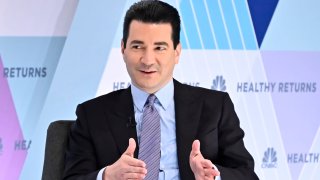
Former FDA Commissioner Dr. Scott Gottlieb speaking at the Healthy Returns conference in New York City on May 21, 2019.
- Dr. Scott Gottlieb told CNBC the omicron variant "extends the timeline" on when Covid will go from being a health emergency to something the world learns to live with.
- "I still think this is going to be a transition year," Gottlieb said Tuesday night. It's likely we will "go from a pandemic into a more endemic phase" but later.
- On Nov. 5, the former FDA chief told CNBC the pandemic phase of Covid could be over in the U.S. in early January.
Dr. Scott Gottlieb told CNBC the omicron variant "extends the timeline" on when Covid will go from being a health emergency to something the world learns to live with.
"I still think this is going to be a transition year," Gottlieb said Tuesday night on "The News with Shepard Smith." It's likely we will "go from a pandemic into a more endemic phase" but later.
Get a weekly recap of the latest San Francisco Bay Area housing news. Sign up for NBC Bay Area’s Housing Deconstructed newsletter.
On Nov. 5, the former FDA chief and current Pfizer board member, told CNBC the pandemic phase of Covid could be over in the U.S. in early January.
Recent studies out of South Africa said omicron significantly reduces antibody protection in those with the Pfizer/BioNTech Covid vaccine.
However, on Wednesday morning, Pfizer said its own research showed a third shot of its Covid vaccine neutralized omicron.
Money Report
Before that news, Gottlieb said the best thing to do is get vaccinated and boosted, "hopefully three doses of vaccine will be protective" enough as the booster "functions like getting infected."
Gottlieb told Shepard Smith he made that prediction when it was assumed delta was the variant to worry about most. However, the doctor said that omicron represents a "divergent evolution" of Covid and that could alert the trajectory of spread in the U.S. and around the world "even after the population has a lot of immunity from infection."
That might be what's happening right now in South Africa, said Gottlieb, who led the Food and Drug Administration during former President Donald Trump's time in office.
"The reason why you're seeing less severe disease and fewer hospitalizations relative to cases is many people in South Africa had infection with delta," he said. "So when they're getting reinfected with this variant, maybe their delta immunity isn't protective against infection but protecting them against symptomatic disease and severe outcomes."
Pfizer CEO Albert Bourla said Tuesday that omicron appears to be milder, but it might also spread faster, which leaves more opportunity for variants to later develop.
The South African Medical Research Council said Saturday that most hospitalized patients with the new variant didn't require supplemental oxygen. Dr. Anthony Fauci, chief medical advisor to the White House, said preliminary data like this was "a bit encouraging."
Disclosure: Scott Gottlieb is a CNBC contributor and is a member of the boards of Pfizer, genetic testing start-up Tempus, health-care tech company Aetion and biotech company Illumina. He also serves as co-chair of Norwegian Cruise Line Holdings′ and Royal Caribbean's "Healthy Sail Panel."